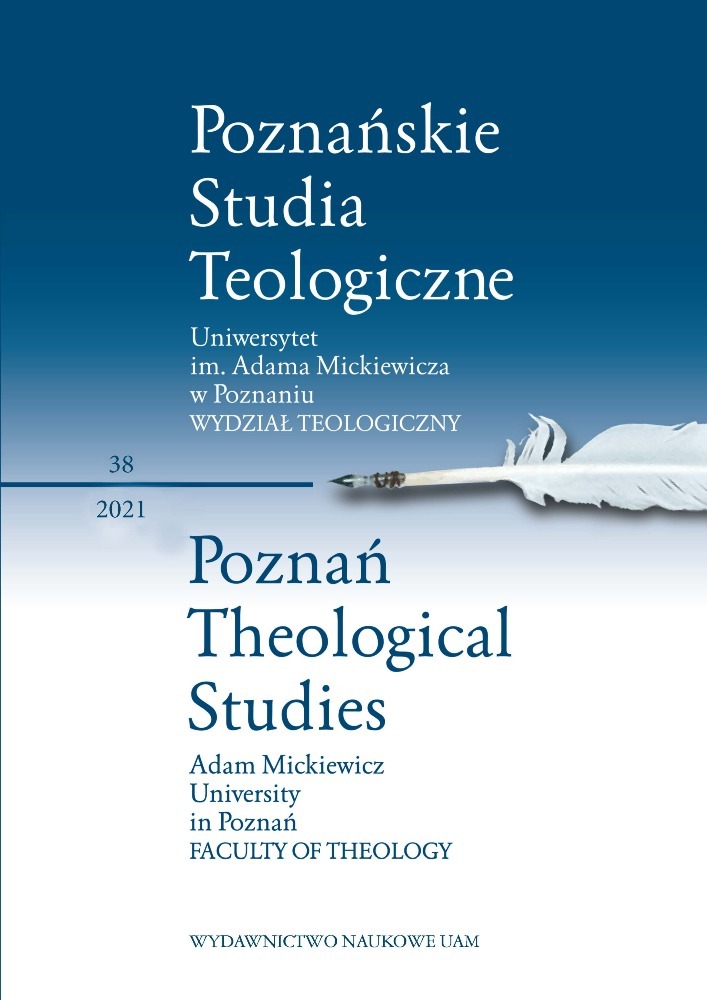Résumé
What was the biblical interpretation of the Jews’ conduct in the final stage of the history of Israel in the context of the Law of Moses right before the times of the New Testament? The proposed exegesis of 1 Macc 8:17-20, which describes the covenant between Judas Maccabeus and the Roman republic, strives to discover the theological evaluation of the behavior of the revolt’s leader conducted by the author of the book. The intertextual method is particularly helpful in discovering the right understanding of the text. This method enables one to purposefully combine the expressions found in the consecutive verses with the same expressions found in the earlier biblical books. The theology that underlies these books will reveal the right sense of the studied passage of 1 Macc. It turns out that the theological evaluation is totally different than the political evaluation, the latter being solely taken into consideration in historical-literary analyses and commentaries. The biblical author has a restrained stance toward the political success of the Maccabees. He wants to reveal their conduct in the context of the Lord’s Law, which strongly proves that the First Book of Maccabees should belong to the canon of the inspired texts.
Références
Bar-Kochva B., Judas Maccabaeus: The Jewish Struggle Against the Seleucids, Cambridge 2002.
Brzegowy T., Księga Izajasza, rozdziały 1-12, NKB.ST XXII/1, Częstochowa 2010.
Brzegowy T., Księga Izajasza, rozdziały 13-39, NKB.ST XXII/2, Częstochowa 2014.
Darsham G., The Original Language of 1 Maccabees: A Reexamination, BN (NF) 182 (2019), pp. 91-110.
Fishbane M., Biblical Interpretation in Ancient Israel, Oxford 1988.
Garrett D., House P.R., Song of Songs, Lamentations, WBC 23B, Nashville 2004.
Gera D., Judaea and Mediterranean Politics: 219 to 161 B.C.E., Leiden-New York 1998.
Goldstein J., I Maccabees: A New Translation, with Introduction and Commentary, AB 41, Garden City 1976.
House P.R., 1–2 Kings: An Exegetical and Theological Exposition of Holy Scripture, NAC 8, Nashville 1995.
Keown G.L., Scalise P.J., Smithers T.G., Jeremiah 26-52, WBC 27, Dallas 1995.
Klein G.L., Zechariah: An Exegetical and Theological Exposition of Holy Scripture, NAC 21B, Nashville 2008.
Laskowski Ł., Druga Księga Machabejska, NKB.ST XIV/3, Częstochowa 2017.
Long B.O., 1 Kings with an Introduction to Historical Literature, FOTL IX, Grand Rapids 1984.
Łach J.B., Księgi 1-2 Królów. Wstęp - przekład z oryginału - komentarz - ekskursy [in:] PŚST, vol. IV, p. 2, Poznań 2007.
Mandell S.R., Did the Maccabees Believe that They Had a Valid Treaty with Rome?, CBQ 53 (1991) 2, pp. 202-220.
Nawrot J., Alliances between Israel and Other Nations in Light of the Pentateuch’s Prohibitions in the Greek Bible, PST 35 (2020), pp. 29-48.
Nawrot J., Aluzje literackie w teologicznej ocenie działań arcykapłana Szymona w 1 Mch 14,5, BibAn 11 (2021) 1, pp. 5-23.
Nawrot J., Dlaczego oni zwyciężają? Teologiczna ocena judejskiej kampanii Antiocha V Eupatora w 1 Mch 6,47-54, SG 31 (2017), pp. 85–103.
Nawrot J., Izrael wobec zakazu sprzymierzania się z poganami w wybranych tekstach Septuaginty: część I, PST 34 (2019), pp. 7-28.
Nielsen K., Intertextuality and Biblical Scholarship, SJOT 4 (1990) 2, pp. 89-95.
Oropeza B.J., Quotes, Allusions, and Echoes: Some Thoughts about What They Mean in Reference to Biblical Scripture, https://www.academia.edu/38547991/Quotes_Allusions_and_Echoes_Some_Thoughts_about_What_They_Mean_in_Reference_to_Scripture.
Pucci J.M., The Full-Knowing Reader: Allusion and the Power of the Reader in the Western Literary Tradition, New Haven 1998.
Rocca S., The Late Roman Republic and Hasmonean Judaea, Athenaeum 102 (2014) 1, pp. 47-78.
Seeman C., Rome and Judea in Transition: Hasmonean Relations with the Roman Republic and the Evolution of the High Priesthood, New York 2013.
Smith G.V., Isaiah 1-39: An Exegetical and Theological Exposition of Holy Scripture, NAC 15A, Nashville 2007.
Stachowiak L., Księga Izajasza I 1-39. Wstęp - przekład z oryginału - komentarz [in:] PŚST, Poznań 1996.
Stern M., The Treaty between Judaea and Rome in 161 BCE, “Zion” 51 (1986), pp. 3-28.
Stuart D., Hosea - Jonah, WBC 31, Waco 1987.
Thompson J.A., The Book of Jeremiah, NICOT, Grand Rapids 2007.
Vermeylen J., Du prophète Isaı̈e à l’apocalyptique. Isaı̈e I-XXXV, miroir d’un demimillénaire d’expérience religieuse en Israël, t. 1, Paris 1977.
Wildberger H., Isaiah 1-12. A Continental Commentary, Minneapolis 1991.
Zollschan L., The Senate and the Jewish Embassy of 161 BCE [in:] The Path of Peace: Studies in Honor of Israel Friedman Ben-Shalom, ed. by D. Gera et al., Beersheva 2005, pp. 1-37.
Licence
© 2021 Uniwersytet im. Adama Mickiewicza w Poznaniu, Wydawnictwo Naukowe UAM, Poznań
OPEN ACCESS

